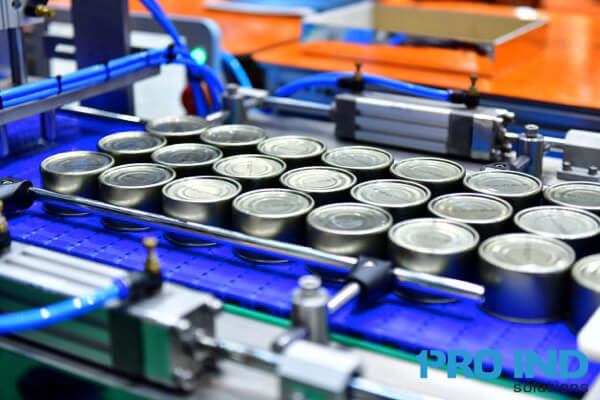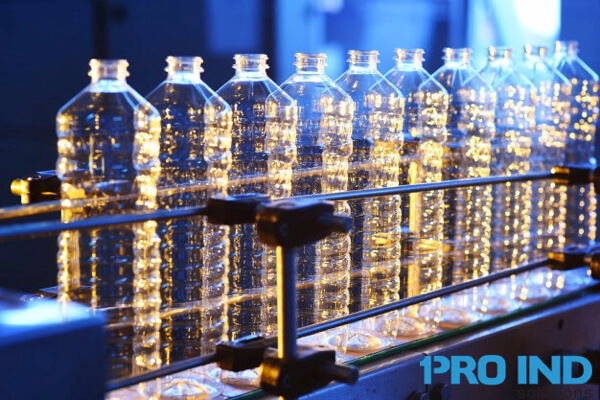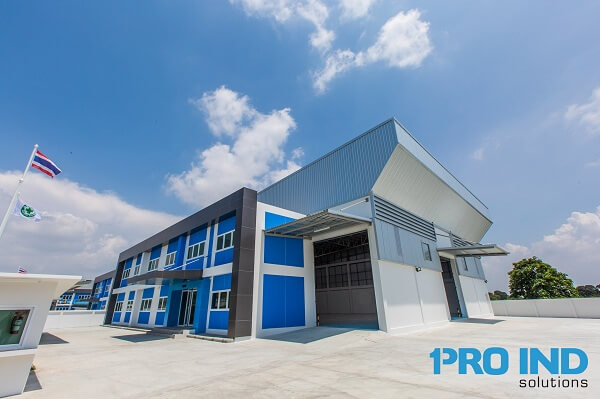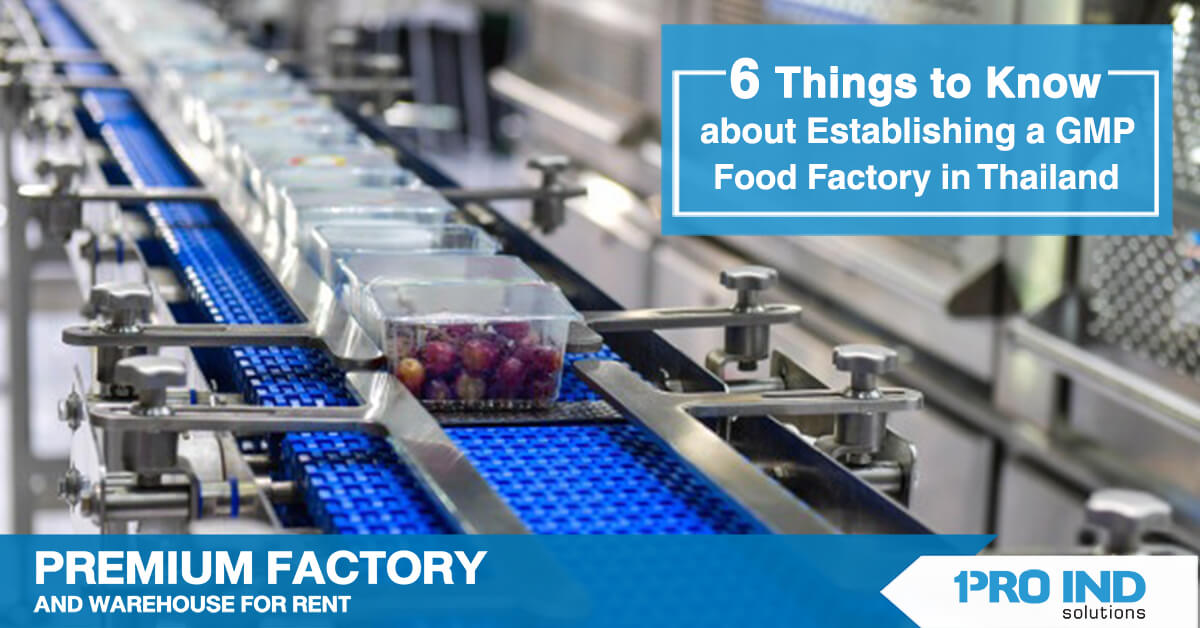6 Things to Know about Establishing a GMP Food Factory in Thailand
6 Things to Know about Establishing a GMP Food Factory in Thailand
There are strict rules and standards imposed by the government and relevant authorities to adhere to the quality of food and medicine sold within Thailand. The rationale behind GMP is that the Thai government expects the food offered to the Thai market should possess the same qualities as those produced with international standards. Besides, the Thai government demands that foodstuffs manufactured in Thailand would comply with export-quality standards.
Accordingly, the GMP essentially informs consumers that these merchandises are clean, safe, and free of impurities (source). Also, it notifies consumers that such goods are free of harmful substances. The GMP standard is the guarantee that the food of the factory is quality, safe, and suitable for distribution, and the purchasers can reassuringly consume these reliable products.
Therefore, for food factories, it is crucial to understand the GMP benchmark, which ensures the production of quality food. In this article, we have selected relevant information on GMP and presented a brief guideline on its application process.
6 Things to Know about Establishing a GMP Food Factory in Thailand
1. What is GMP?
First of all, let us begin with the definition of GMP. It stands for Good Manufacturing Practice in food production processes. GMP is the certified worldwide standard. There are various criteria for business operators to follow in their food production processes and to adequately regulate standards of cleanliness and safety. Moreover, the GMP measurements help prevent risks from food poisoning and unsafe food, which may harm consumers.
GMP standards are very reliable because they are accepted universally for controlling food production processes. To formulate the regulations of this standard, food academics throughout the globe underwent numerous researches to ensure that this benchmark is proper for food safety and applicable universally.
Also, foods under GMP regulations guarantee that such products are not harmful to consumers, and the manufacturing processes are hygienic. Thus, the government exercises this criterion so that foods within Thailand match the international quality standards.

2. What does GMP monitor?
GMP measures the entire production loop in the food production processes and distribution channels until the products reach the end consumers. From building materials to the production processes, the establishment as a whole must be clean, safe, and appropriate for food productions. Furthermore, the GMP administers precise assessments in different production stages from the planning stage to the raw material selection, to the quality control, to the product storage, and finally to the finished products. GMP also controls the handling of logistical operators. The government officers would assess based on the information on the whole production loop to certify the quality of the product.
GMP is a primary certification that will lead to more distinct standards, such as ISO 9000 and HACCP (Hazards Analysis and Critical Points).
3. How many types of GMP are there?
There are two separate types of GMP standards. The first type is the GMP general hygiene for all food types, while another criterion is the specific GMP. This type focuses on the safety risks of particular food products and has a more rigorous set of regulations than the stand GMP.
4. GMP General Hygiene (General GMP)
Specifically, there are six factors, whereby the relevant authority would assess in their evaluation processes. They would analyze the following elements:
The first factor is the production facility and its location. They would determine whether the chosen site is suitable for food manufacturing. For example, is the facility in a clean, appropriate environment that has access to the freshwater supply?
Necessarily, the establishment must be suitable and located far away from sources of contamination. The establishment also should have the appropriate size fitting for the production process. The design and construction elements need to support easy maintenance and cleanliness. In the food production factory, there must be separate dedicated sections for food production. Finally, the facility should also have a proper ventilation system.
Second, they would check the tools, machinery, and other appliances in the manufacturing process. The officers would judge these tools on their conditions, their applications in the production processes, and their appropriateness. These machines are critical in producing clean, safe food.
The machinery and equipment are from harmless materials that do not react with food, rust-free, non-toxic, durable, and have appropriate sanitation. The users must sterilize them before using them in the production process. Besides, they need to be appropriately stored, and the storage area should have protection against dust and dirt as well.
Third, the officers would evaluate your production process control. They would check how you monitor and control the quality of your manufacturing processes. Throughout the production process, the staffs need to control for sanitation in every step. They have to control their activities from raw materials, ingredients, containers, production, to the final stages of storage and transportation of food products.
Next, they would also appraise the sanitation of your overall process. From the cleanliness of your facility to your raw materials, from your production processes to your storage, from your staff to your equipment, from your packaging to your logistics channels, they would reach the entire assessment.
Also, the sanitation system within the premises should be adequate for a hygienic food production facility. The officers would check your facilities, such as your sinks, toilets, waste disposal systems, and sewage system, whether they are pertinent and have convenient operations or not. Moreover, the facility should have adequate protection against animals and insects.
The next dimension that they assess is how you maintain and clean your equipment. The officers would determine whether these devices are clean and safe and whether they are stored in appropriate locations, fitting for food productions. The decent maintenance and cleaning are crucial since it prevents impurities, including dangerous substances from contaminating the food products. The factory, machines, and all the tools have to be cleaned and well-maintained both before and after the production.
Another element in the GMP criterion is the hygiene of your personnel. The auditors would examine what steps you employed to create a clean working environment. For example, some factories build clean rooms and take extensive measures to ensure the cleanliness of their employees and lower to risk of food contaminations. Also, staffs have to wear appropriate uniforms to reduce hazardous risks. Personnel must wear clean and suitable clothing for work.
More importantly, the employees should be in the right health conditions without any contagious diseases. They must not suffer from tuberculosis, skin disease, or leprosy.

6. GMP Specific Products
This criterion is an extension of the standard GMP. It tailors the risks and safety of specific food products, especially for drinking water. Another prominent GMP particular product is ready-to-consume liquid milk, which needs to be duly heated, sterilized, and pasteurized. For specific GMP products, the regulations vary under the type of each product.
7. The enforcement of GMP
The Food and Drug Administration of Thailand has adopted the rules of GMP standards as a law. As stipulated in the notification of the Ministry of Public Health (Issue 193) BE 2543, the food operators must study the specifications thoroughly. The food producers need to supply quality food under legal regulations. The GMP standard has come into effect from 24 July 2001 and covers the production methods, production tools, equipment, and storage procedures.
We have posted a short, easy-to-understand video on the topic. The video, from the Thai FDA, entails a clear guideline and proper methods of food production under GMP-general hygiene.
We hope our article provides some refreshing insights into the GMP standards, which are essential to all food factory operators. This regulation is analogous to the internationally recognized GMP. When the operators offer food that meets its provisions, the consumers can enjoy clean and safe food, which has a lasting effect on all food factories.
If you are interested in renting a high-quality factory in Thailand, please feel free to contact us anytime. Our properties are ideal for food production and can readily meet GMP standards. They have complete functions, and they are in excellent locations. Plus, we support our customers with free repair services throughout the leases as well as a full range of customer support services. Our projects have high-security systems with 24-hour security guards, and CCTVs.

Sources:
https://www.chi.co.th/article/article-1212/
You might also like.
- 8 Things to Know About the Revised Thailand Factory Act The new Factory Act came into effect on October 27th, 2019. The government encouraged investment in the industrial sector...
- There are 8 Convincing Advantages of Renting a Factory or a Warehouse. When entrepreneurs establish their businesses or expand their operations, choosing the appropriate factory o...
- 8 Things to Consider in a Factory and Warehouse Rental Contract in Thailand Factory rental and Warehouse rental have become a prominent choice for business people today. Because of...
- Five innovations that PRO IND factories and warehouses for rent use for heat prevention. Global warming is getting worse every year, and Thailand is greatly affected. It has advers...
- There are 5 essential reasons why we should focus on heat prevention inside the factory and warehouse. The hot weather in Thailand does not seem to lessen. From statistics, the te...
- Five reasons examine why the Samut Prakan province did not flood when Thailand's Big Flood in 2011 occurred. When there was a big flood in 2011, Samut Prakan Province was virtual...
- 5 reasons why renting a factory or a warehouse in the Bangna-Trat area is an excellent idea for conducting your business in Thailand. Many people may wonder why they should rent fa...
- 4 Taxes Related to Factory Rentals and Warehouse Rental Currently, many entrepreneurs and business people are renting factories and warehouses for their business operations because...
- 6 Advantages of Setting up your Factory and Warehouse in Samut Prakan When deciding on the area to base your factory or warehouse, surely, Samut Prakarn would come up as one of the...
- 6 Factors in Choosing an Ideal Rental Factory or Warehouse for Your Business. We present six vital factors in determining the right factory or warehouse for your business. Picking ...
- The Difference between 3-Phase Factory Electricity and 1-Phase Ordinary Electricity What is the difference between 3-phase and 1-phase electrical systems? Which model is suitable f...
- 5 Things you should Know Before Renting your First Warehouse. As your business prospers, you need substantial space to store your products and raw materials. Selecting your first w...
- 10 Features of Excellent Rental Factory and Warehouse Layouts Factory and warehouse layouts are critical to entrepreneurs and business owners' successes in their production. Rentin...
- 6 Advantages of uPVC Windows and Doors for Factory and Warehouse Many customers, who have visited our factory-and-warehouse-rental projects, are delighted with the quality of our d...
- 5 Typical Scams in Factory and Warehouse Rentals Recently, entrepreneurs and business owners are preferring to rent factories and warehouses rather than owning these properties the...
- 3 Benefits of Epoxy Floor Coatings for Factory and Warehouse. Epoxy floor coating is a synthetic rubber that is produced by the chemical reaction between Epoxy and Polyamine combin...
- 10 Effective Ways to Prevent Factory and Warehouse Fires The warehouse and factory buildings are essential to all types of operating businesses. Frequently, they are the businesses...
- 5 Practical Ways to Save Energy in your Rental Factory and Warehouse Modernized factories and warehouses nowadays are undergoing a drastic change: many factories and warehouses are...
- 7 Insights on Lean Management to Reduce Costs and Increase Profit for Factory Operators The lean system (LEAN) is an ideal practice for factory operations. It helps decrease avoida...
- 4 Advantages of PU Roofs for Rental Factory and Warehouse PU Foam insulation is an excellent material for omitting heat transfer into our rental factory and warehouse areas. It com...
- Key Points on Thailand's BOI: Clear Implications for Factory and Warehouse Operators Board of Investment of Thailand (BOI) has the core responsibility in promoting foreign direct i...
- 7 Benefits of Aluminum Composite, and Because of these Reasons, We use it for our Rental Warehouses and Factories. Presently, in the construction materials sector, we frequently no...
- 8 Significant Expenses Related to a Factory and Warehouse Rental in Thailand Renting a factory or a warehouse when you establish your company in a new country is a vital step in yo...
- 8 Questions to Ask When Choosing Warehouse for Rent in Thailand Selecting a suitable warehouse rental is imperative to business success. The current business landscape demands stra...
- Thailand’s Various Rental Warehouse Types and their Purposes This article would distinguish the various warehouse for rent types in Thailand. We can identify a warehouse facility a...
- 4 Safety Dimensions for Factory and Warehouse Operations In successful industrial enterprises, there are many factors that entrepreneurs and plant operators need to consider. Safet...
- Warehouse Management Techniques. How to Practice Warehousing Activities Efficiently for your Business? In manufacturing businesses, warehousing creates substantial financial impact...
- 5 Factors to Consider when Renting a Factory or Warehouse in Thailand Selecting a high-quality rental warehouse or factory is a fundamental step in a successful business establishm...
- 4 Necessary Steps for your Factory and Warehouse Relocation Factory and warehouse rentals have become the current viable choice for business operators because this choice offers ma...
- 5 Things to know about Thailand’s Cold StorageWarehouse for Rent A cold storage warehouse is a warehouse that controls the temperature in the storage area, and the appropriate temp...
- 5 Negotiation Tips for Thailand’s Factory and Warehouse Rental Contracts Selecting a factory and warehouse for rent is an integral part of your business success. In Thailand, succe...
- What are the Similarities and Differences Between the GMP and HACCP Standards in a Factory in Thailand? Two crucial, global standards for food manufacturers are the GMP and HACCP s...
- 7 Things to Know about Establishing a HACCP Manufacturing Facility in Thailand The HACCP system stands for Hazard Analysis and Critical Control Point System. Food production employ...
- 6 Highlights on Thailand’s Factory Clean Rooms Cleanrooms are an essential part of manufacturing sites, which demands high levels of cleanliness. The cleanrooms enable your product...
- 4 Insights on Thailand’s Bonded Warehouse Currently, rental bonded warehouses in Thailand have gained much popularity among business people. Bonded warehouses are especially useful...
- 3 steps to rent a factory and warehouse in Thailand and everything you should know to help you prepare when looking for factories for rent and warehouses for rent. Nowadays, factor...
- 7 crucial factors in choosing a factory and warehouse location in Thailand 7 crucial factors in selecting a rentalwarehouseor factory location in Thailand. This article is relevant...
- 5 things you need to know when choosing a factory for rent and a warehouse for rent in Thailand Quality factories or warehouses for rent can boost the tenant's company image and cr...
- 7 Advantages of Renting Warehouses in Pro Ind Warehouse Park 4 Project Renting a warehouse is a crucial step in managing business inventory, whether for small or large businesses....
- 8 Special Services When Renting a Factory, or Warehouse with Pro Ind Solutions Co., Ltd. At Pro Ind Solutions Co., Ltd., we prioritize the quality of our rental factories, and our ...
- 6 Advantages of Renting an Elevated Warehouse for Rent Choosing an efficient warehouse for rent is a crucial factor that significantly impacts the success of business operations to...



.png)
.png)

